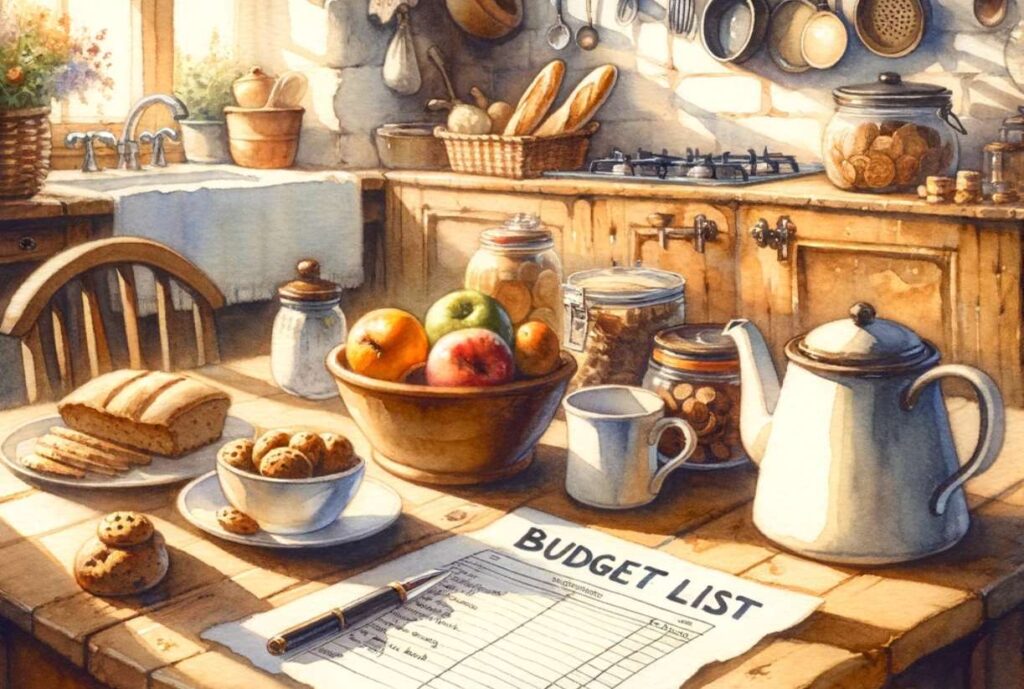Are you a homemaker or stay-at-home parent trying to live off one income or just want to save more money for your family? Adopting a frugal lifestyle can bring a sense of richness and simplicity to your life, benefiting your wallet and well-being.
When you are trying to save money, it often requires investing more of your time or making the most of what you already have before buying new things. Being resourceful will save you money.

If you want to live frugally, you have to change your mindset. It’s not always easy, and you’ll probably have to sacrifice wants over needs. But when your family has goals or priorities, being a frugal homemaker is worth it.
With practical steps like cooking at home, making do with what you have, setting budgets, gardening, and learning new skills, you can take charge of your finances and become a happy, frugal homemaker.
Here are 10 practical steps to help you become a more frugal homemaker:
As an Amazon Associate, I earn from qualifying purchases. Read my full disclosure here.
10 Steps to Becoming a Frugal Homemaker
1. Set a Budget
Before you do anything else, I recommend sitting down and working out a budget for your family.
Creating a budget helps you to have a clear understanding of your financial situation. By recording how much money is coming in and tracking where it goes out, you can identify areas where you are overspending and adjust accordingly.
It doesn’t have to be complicated or time-consuming. Even a simple budget helps you with your spending habits.
It may seem obvious, but the key is to spend less than you earn.

2. Cook homemade meals
Cooking at home can be a great way to save money and stay healthy. It’s much cheaper than eating out, and you can control what ingredients go into your family’s food.
If you keep your pantry stocked with good ingredients, you can plan your weekly meals, cook large batches, and eat on leftovers.
You can also learn how to replace store-bought items with homemade ones, which is a game-changer. Try making homemade bread, pie crusts, chocolate chip cookies, yoghurt, sourdough, spice mixes, and apple crumble.
With a little effort, you can enjoy delicious and nutritious meals at home while saving money. Here are some quick tips to get started:
- Find a handful of recipes for the week from cookbooks or online.
- Write out a meal plan including breakfast, lunch and dinner.
- Make a shopping list and stick to it.
- Prepare any meals or snacks you may want to in advance to make the week ahead easier.
Food is one of the quickest and easiest expenses to reduce when you take the time to cook at home. I encourage anyone wanting to save money or live more frugally to focus on this skill first.
3. Buy in Bulk
When you prepare homemade meals frequently, you tend to use lots of ingredients. This is particularly true when baking, preserving or canning food from your garden.
To save money on these pantry staples, purchasing ingredients in bulk is a great option. Although it may seem intimidating and expensive initially, the cost is generally much lower than purchasing small individual packages.
Buying in bulk also reduces the number of trips you take to the grocery store, resulting in savings on petrol.
Remember to support your local farmers by buying produce, dairy, meat and eggs from them.

4. Make Your Own Home & Beauty Products
Instead of buying cleaning and beauty products, try making them yourself. This step may sound intimidating, but once you start, you’ll wonder why you didn’t start earlier.
It can be fun, cost-effective, and environmentally friendly. Shampoo, conditioner, body wash, washing powder and soaps can all add up. Many of these products are filled with toxic chemicals and microplastics, not to mention all the packaging.
There are many amazing, tried, and true tutorials online to help you get started. Here are a few of my favourite recipes to try:
5. Grow Your Own Food
There’s something incredibly satisfying about eating food that you’ve grown yourself. Not only does it taste better, but it can also save you a significant amount of money. Frugality is all about being thrifty, so growing your own food seems like a no-brainer if you can!
Start with easy-to-grow herbs and vegetables, such as basil, lettuce, and tomatoes. As you get more comfortable, you can expand your garden.
Remember, you don’t need much space—a few pots on a balcony or a small plot in your backyard will do.
The best part is gardening is a relaxing and fulfilling pastime that can provide a sense of achievement.

6. Use What You Already Own
Becoming a frugal homemaker means being thrifty. Before you make a purchase, it’s always a good idea to take inventory of what you already have. This will help you avoid buying items that you don’t need, and it can also help you save money.
Keep items that you can repurpose or reuse. For example, an old t-shirt can be turned into a cleaning rag, or an empty jar can be used for canning jam.
Repurposing items like this can help you get more use out of the things you already own, which in turn reduces the need to buy new things.
When repurposing items, it’s important to be creative and think outside the box. For example, you can use an old sheet to make a tablecloth. Or old towels to make reusable paper towels.
By giving new life to what you already own, you can not only save money but also reduce waste and help the environment.
7. Be Resourceful
In order to lead a frugal lifestyle, it is important to understand the value of resourcefulness. This means looking for ways to make the most of what you already have rather than constantly buying new things.
Repairing items instead of replacing them, borrowing instead of buying, and swapping items with others instead of shopping for new ones are some great ways to save money and make the most of the resources available to you.
There are plenty of resources available to help you learn how to repair and maintain items around your home, such as fixing a leaky faucet, mending a torn garment, or refurbishing an old piece of furniture.
These skills not only save you money but also add value to your life by giving you a greater sense of self-sufficiency and pride in your ability to take care of your belongings.
By embracing a resourceful mindset and adopting these skills, you can live a more sustainable, budget-friendly lifestyle while also reducing your impact on the environment.
8. Cut Back on Brands and Spending
When it comes to shopping for groceries or household items, it’s easy to fall into the trap of thinking that the most expensive brands are always the best. That’s not always true. I like to look at the quality of ingredients and make my decision based on that.
Another way to save money is by cutting back on discretionary spending. This means looking closer at your monthly expenses and evaluating what you truly need. For example, instead of paying for an expensive gym membership, you could try working out at home using free online resources or inexpensive equipment.
Instead of buying new books, you could borrow them from the library for free. Instead of ordering Starbucks every time you run errands, make a copycat version before you leave the house.
By making these simple changes, you can save money without sacrificing quality or convenience.
9. Learn New Skills
The internet is a treasure trove of free educational resources. Whether it’s learning how to sew, cook, or build, you can find tutorials online. These skills can save you money and make you more self-sufficient. Plus, they can be a great way to spend your time productively.
10. Change Your Definition of Success
Finally, success doesn’t mean having the most expensive items or the latest gadgets. Success can be having a loving family, a comfortable home, and the time to enjoy the little things. When you shift your perspective, you’ll find that living frugally doesn’t mean missing out—it means focusing on what truly matters.
Remember your why and stick to your goals.